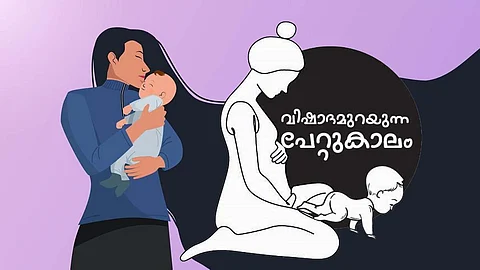

Postpartum psychiatric issues are categorized into three distinct types: baby blues, postpartum depression and postpartum psychosis. Among these, baby blues are considered relatively minor. However, the other two demand proper medical intervention, attentive care and thoughtful consideration. Women with a history of depression or those with low immunity are particularly vulnerable to postpartum depression.
Neethu Chandran
It was only a few years ago that the term "postpartum depression" entered the lexicon of Keralites. Yet, by then, significant damage had already been done—numerous children had been fatally ensnared in the despairing embrace of their mothers. Following childbirth, a woman’s body undergoes a myriad of transformations. Hormonal shifts can lead to profound mood alterations. Additionally, the daunting task of navigating the intricate world of childcare, coupled with the physical pain from childbirth or delivery surgery, insomnia, and a partner’s neglect, can leave new mothers utterly exhausted and vulnerable.
Simultaneously, the daunting task of navigating the complex world of childcare, the physical pains of childbirth or delivery surgery, insomnia, and a partner’s neglect can leave women utterly exhausted. Even seemingly insignificant matters, easily dismissed by others, can deeply wound a mother's psyche. In such a fragile state, moods can shift in mere seconds, leaving her bewildered by her own emotions.
Symptoms of depression manifest as inexplicable bouts of crying, sudden outbursts of anger, unsettling silence, self-harm, and even harm to one’s child. This condition can be entirely surmounted with the support and understanding of loved ones, counseling, and, if necessary, medication. However, recognizing such a fragile state of mind is the crucial first step toward healing.
As a result of inadequate awareness, the depth and severity of problems caused by postpartum depression continue to escalate. Doctors emphasize that failing to detect the issue early and not providing necessary treatment can significantly worsen the condition. In a survey conducted by Pooja Prasad of Amrita Vishwa Vidyapeetham, Kochi, titled "Women in Kerala with Postpartum Depression," it was discovered that 46.1 percent of mothers in Kerala were entirely unaware of the baby blues. However, 85.2 percent of respondents were aware of postpartum depression.
Moreover, 77.3 percent of respondents reported experiencing symptoms of postpartum depression. Notably, 53.1 percent of these women were managing to recover on their own. This insightful study has been published in Bioscience Biotechnology Research Communications.
Pregnancy and childbirth are inherently stressful processes. Psychiatrist Dr Peter Joseph, currently on deputation at Chalakudy Taluk Hospital, says it is natural for anxiety to heighten with the looming responsibilities of caring for a newborn. Women face significant mental challenges post-childbirth due to the drastic hormonal fluctuations in progesterone and estrogen after delivery.
Postpartum psychiatric issues are categorized into three types: baby blues, postpartum depression, and postpartum psychosis. While baby blues are relatively minor, postpartum depression and postpartum psychosis require proper medication, attention, and care. Women with a history of depression or those with low immunity are particularly susceptible to postpartum depression.
Baby Blues
Around 50-75 per cent of women experience baby blues, following childbirth. These mild symptoms, which may include bouts of crying, unusual sadness and feelings of melancholy, typically manifest within 3-5 days after delivery. Though these emotions are distressing, they do not significantly impact a woman's overall mood and usually resolve on their own within a week or two without the need for medication.
Postpartum depression
Postpartum depression affects 10-15 per cent of women after childbirth and can persist for 3-6 months. While its symptoms resemble those of baby blues, including crying and sadness, they are more severe and may also involve suicidal thoughts, pervasive negativity, a lack of interest in the baby and insomnia.
Those with a history of depression are at an increased risk of experiencing postpartum depression. Likewise, individuals who have previously suffered from postpartum depression are more susceptible to future depressive episodes. It is crucial for those affected to have constant support and companionship. With proper medication and attentive care, this condition can be effectively treated and overcome.
Postpartum psychosis
Postpartum psychosis stands as the most severe among these conditions. Afflicting 1-2 per cent of women after childbirth, it typically emerges after the first delivery and is more prevalent among those with a history of mental health challenges. Alarmingly, 50 per cent of those who have experienced postpartum psychosis are at risk of recurring episodes.
Postpartum psychosis encompasses complex mood disturbances such as insomnia, altered thinking patterns, delusions of an unreal world, doubts regarding the baby and irrational fears of harm from others. Their thoughts and actions often veer far from reality. Women afflicted with this condition may pose a risk of harm to their children, necessitating measures to keep the child safe from the mother. Fortunately, with proper medication and therapy, this illness can be effectively treated.
(Courtesy: Dr Peter Joseph, MD, Psychiatry; Vimukthi De-addiction Centre, Chalakudy Taluk Hospital)
(Next in the series is Whispers of the mind: Unseen illusions)
